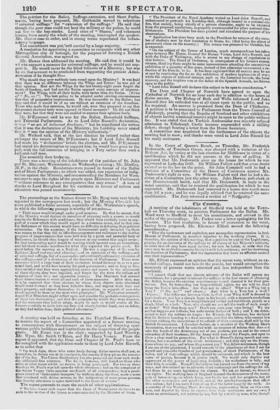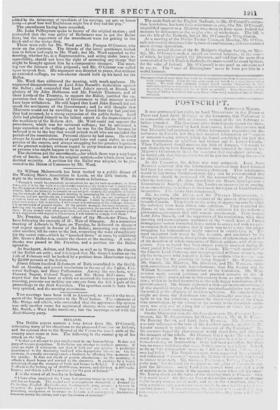Cllr Country.
A meeting of the inhabitants of Sheffield was held at the Town- hall on Thursday week, to petitions Parliament for the Ballot. Mr. Ward went to Sheffield to meet his constituents, and arrived in the midst of the proceedings. Mr. Parker sent a letter apologizing for his absence. The first resolution, in favour of protection to the voter, having been proposed, Mr. Ebenezer Elliott moved the following amendment- " That the landowners and capitalists now monopolize representation in both Houses of Parliament, in manifest injustice to the working classes. It is, therefore, the opinion of this meeting, that a petition be sent to the Legislature, praying for an extension of the suffrage to all classes of her Majesty's subjects, in order that all may have equal justice ; for vote by ballot, in order that the voter may be enabled to exercise his right with independence ; and for shortening the duration of Parliaments, that the represented may have an efficient control over their representatives."
Mr. Elliott expressed an opinion that the secret rote, without an ex- tended suffrage, would riot benefit the people, but would strengthen the monopoly of persons worse educated and less independent than the mechanic.
"I cannot think that any sincere advocata of the Ballot will oppose my amendment, for a proposal to extend the suffrage is the best means of obtaining the Ballot, because the existing constituencies would demand it fur their pro- tection. But, by demanding our long-withheld rights, we are told we shall bring the Tories into office. Are they not ill office? What is a Whig but a Tory ? (" No, no!" and cheers.) And what is a Tory but a wolf ? ( Cheers.) The difference between them is, that your Whig wolf is dressed in. lien's feathers, and has a sheep's heart in his bosom, with a serpent's cerebellum fin. a brain. Your Tory is a straightfurward robber and cut-throat, greedy as a shark, blind as a bolt. Now, why should we not tell the truth of such people as thew? Will they keep you? Don't you earn your own living? We are neither beggars nor robbers, but unfortunate feeders of both ; and I am deter- mined to feed the robbers no longer : for Russell, the Reformer, has declared that hi, Refinan humbug is a final incegire, and that the idlers, who cannot lire without robbing the industrious of twa-thirds of their earnings, shall still be the British Government. I therefore declare, as a member of the Working Men's Association, that we will be satisfied with no measure of reform that does not take the hands of the Aristocracy out of our pockets, put an end to the armed cowardice of their insolence, fill the Army with men of the People, and open to them a clear road for promotion. For what is Russell's dying speech and con- fession, but a manifesto of the whole Aristocracy; and they rely on the Praeto- rians whom we pay, and whom they cannot pay ? Yet, fellow.townsmen, though I am one of the plundered, I would concede to the plunderers all that I ask for myself and you—the benefits of just government, of short Parliameuts, of the ballot, and of that suffrage which idiould be universal, and which is the best name of justice, because it is justice itself. We would only deprive our oppressors of the power of legislating foolishly ; for wickedness is fully, and their fully is suicide. Russell's declaration has turned me from the error of my ways, and determined me to advocate short reckonings and the suffrage fur all. Let there be no more legislation for classes. We ask no favour, we demand our rights. The working men of linglaud 'leniend the destruction of the mono- poly of lawonaking, on which ham:, not God's law and his prophets, but all the other monopolies and iniseldsfs, and all the mischief-mongers that affect this nation ; but I sin sorry I cannot say that the latter hung by the neck. As a member of the Working Men's Association, representing them on this occas slim, and deputed by them to express Jere their sentiments and my own, I move au amendment, not written by toe, but by a workeig man, who, though
robbed by the Aristocracy of two-thirds of his earnings, yet gets an honest living—a proof how well Englishmen might live if they had fair play."
The amendment having been seconded, Mr. Luke Palfreyman spoke in favour of the original motion ; and contended that the true policy of Reformers was to get the Ballot first; but the supporters of the amendment were for getting in the thick end of the wedge first.
There were calls for Mr. Ward and Mr. Feargus O'Connor, who were on the platform. The friends of the latter gentlemen wished Lim to follow and reply to Mr. Ward; but Mr. Ward appealed to the meeting, whether he, as a Representative, and acting under heavy re. sponsibility, should not have the right of answering any charge that might be brought against him by a comparative stranger. The meet- ing saw the fairness of this proposal; and Mr. O'Connor was culled upon to speak first. His argument was directed to prove, that without an extended suffrage, no non-elector should bold up his hand for the Ballot.
Mr. Ward then addressed the meeting, with much applause. He expressed disappointment at Lord John Russell's declaration against the Ballot ; and contended that Lord John's speech at Stroud, the pledges of Sir John Hobhouse and Mr. Poulett Thomson, and of three Lords of the Treasury, to support the Ballot, justified the ex- pectation that the opposition of Government to that measure would have been withdrawn. He still hoped that Lord John Russell did not speak the sentiments of the Government; and he still thought that Ministers would not be unwilling to be forced from the bad position they had assumed, by a strong expression of the public feeling. Lord John bad pledged himself to the fullest extent to the improvement of the machinery of the Reform Act. Mr. Ward could not support the amendment, which was for universal suffrage; but he advocated a large exteution of the suffrage ; and he was for the Ballot because he believed it to be the key that would unlock to all who are excluded the portals of the constitution. Personal objects he had none. He would always be found the advocate of equal laws and equal rights to every portion of the empire, and always struggling for the greatest happiness of the greatest number, without regard to petty interests or the parties or persons who might happen to be in power. The chairman put the amendment,—for which there was a very large show of hands; and then the original motion,—for which there was a decided majority. A petition for the Ballot was adopted, to be pre- sented to the Honse of Commons by Mr. Ward.



























 Previous page
Previous page